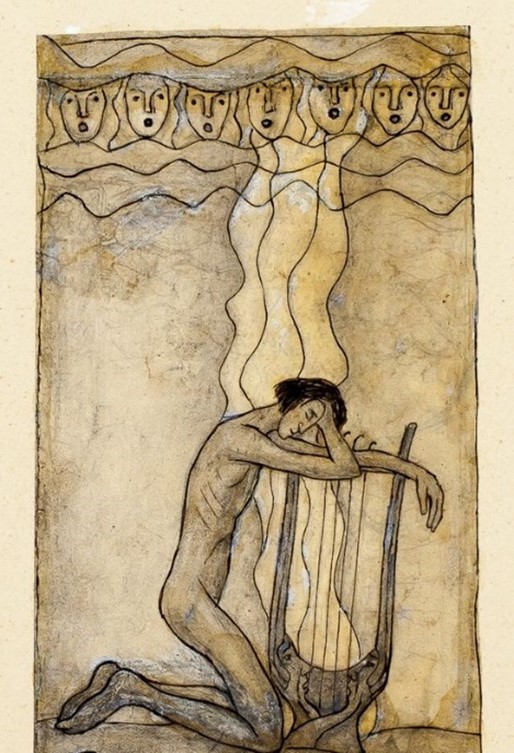Call for Papers
CALL FOR PAPERS
16th International Conference of the Estonian Association of Comparative Literature
World Poetry Today: Production, Translation, Reception
University of Tartu, Estonia, October 1 to 4, 2025

Poetry is inherently “worldly”, both polytemporal and polyspatial, as stated by Jahan Ramazani. While poems belong to their immediate historical moment and national culture, they are at the same time transnational as well as transhistorical through their forms, techniques, rhetorical strategies, and language. (J. Ramazani, Poetry in the Global Age, 2020) Using the term “world poetry”, we wish to invite papers which focus on the intercultural dissemination of poetry and explore how the worldwide production, translation, and reception of poetry are influenced by (and, in turn, influence) the digital environment, which has led to the emergence of new mediums/forms of poetry. Today, poetry is living and circulating as never before, both in book form and in the digital as well as the physical environment – its spread into the public space is already demanding attention in poetry studies (see C. Benthien, N. Gestring, Public Poetry, 2023). Defined by Tartu’s renowned literary scholar Juri Lotman as “complexly constructed meaning” (Analysis of the Poetic Text, 1976, p. 35), poetry continues to pose new challenges for writers and translators, critics and readers.
The keynote speakers are Claudia Benthien (Universität Hamburg), Francis R. Jones (Newcastle University), Jahan Ramazani (University of Virginia), and A.E. Stallings (University of Oxford), as well as Peeter Torop (University of Tartu), Rein Raud (Tallinn University) and Mihhail Lotman (Tallinn University, University of Tartu).
Claudia Benthien (b. 1965) is Professor of German Literature at Universität Hamburg, Germany. Her research field covers Germans literature of the 17th–21st centuries (especially Baroque, Classicism, Early Modern, and Contemporary) as well as contemporary art and culture. The theoretical framework she uses spans cultural theory, gender studies, intellectual history, aesthetics and intermedial studies. Her recent research deals with poetry in the digital age (for which she has received an ERC Advanced Grant), specifically ‘public poetry’ in urban space and on the internet, as elaborated in her monograph Public Poetry. Lyrik im urbanen Raum (with Norbert Gestring, 2023).
Francis R. Jones (b. 1955) is Emeritus Professor of Translation Studies, Newcastle University, UK, and a translator of poetry, mainly from Bosnian, Croatian and Serbian into English, though also from Dutch, Hungarian and Russian. He has twice been awarded the Poetry Society’s Popescu Prize (formerly the European Poetry Translation Prize). In Poetry Translating as Expert Action: Processes, Priorities and Networks (2011), he explores how translators work within networks of people and texts: publishing teams, fellow translators, source-culture enthusiasts, and translation readers and critics.
Jahan Ramazani (b. 1960) is Professor of English at the University of Virginia, USA, a literary scholar specializing in modern British, Irish, American, African, Caribbean, postcolonial poetry within a global perspective. His published works include A Transnational Poetics (2009, the American Comparative Literature Association’s Harry Levin Prize for the best book in comparative literary history), Poetry and Its Others: News, Prayer, Song, and the Dialogue of Genres (2014), Poetry in a Global Age (2020). Ramazani is a recipient of numerous prizes and fellowships and is an elected member of the American Academy of Arts and Sciences (2016) and the American Philosophical Society (2022).
A.E. Stallings (b. 1968) is an American poet, essayist, and translator from Ancient Greek, Modern Greek and Latin and currently Oxford Professor of Poetry (2023–2027). She has published four highly acclaimed collections of poetry, winning the Richard Wilbur Prize for Archaic Smile (1999), and three book-length verse translations (e.g. Lucretius’s The Nature of Things (2007)), winning the Willis Barnstone Translation Prize in 2010. She is a recipient of fellowships from the Guggenheim Foundation and the MacArthur Foundation and an elected member of the American Academy of Arts and Sciences (2012).
Peeter Torop (b. 1950) is Professor of Cultural Semiotics at the Department of Semiotics of the Institute of Philosophy and Semiotics at the University of Tartu, Estonia. He is also co-editor of the journal Sign Systems Studies and the book series Tartu Semiotics Library. He has been co-editor of special issues of the European Journal for Semiotic Studies (New Tartu Semiotics, 2000, 12:1) and the International Journal of Cultural Studies (The Uses of Juri Lotman, 2015, 18:1). His research field covers the history of translation, semiotic and transmedia aspects of translation, semiotics of culture and translation studies, literary studies and textology. His books include Tõlge ja kultuur [Translation and culture] (Tallinn – Tartu: Tartu Ülikooli Kirjastus, 2011); Totaaltõlge [Total translation] (Tartu: Tartu Ülikooli Kirjastus 2024), Text within Text – Culture within Culture (ed. with K. Kroó, Budapest-Tartu: L’Harmattan, 2014) and The Companion to Juri Lotman: A Semiotic Theory of Culture (ed. with M. Tamm, London and New York: Bloomsbury Academic, 2022).
Rein Raud (b.1961) is Distinguished Professor of Asian and Cultural Studies at the School of Humanities, Tallinn University, as well as a novelist, poet and translator of (among others) Dante Alighieri, Nelly Sachs, Paul Celan and William Carlos Williams, and a large number of Japanese and Chinese classical poets. His views on cultural theory are summarized in Meaning in Action (Polity 2016) and his more recent academic work includes Being in Flux: A Post-Anthropocentric Ontology of the Self (Polity 2021). He is the recipient of numerous literary prizes and fellowships, the Baltic Assembly Prize for Literature (2024) being the latest, and the only person to have been awarded both the National Research Award and the National Cultural Award of Estonia.
Mihhail Lotman (b. 1952) is Professor Emeritus of Tallinn University and Visiting Professor of Semiotics at the University of Tartu. He is co-editor of the journals Sign Systems Studies and Studia Metrica et Poetica. He is the author of over 300 academic publications (including 7 monographs) in the fields of semiotics, poetics, linguistics, comparative literature and the history of Russian literature. In addition, he is the author of a large number of popular science and journalistic articles. YouTube contains more than a hundred of his lectures.
Papers are invited to address the following issues:
The notion of “world poetry”
How to think about “world poetry”? How worldly are its poetic forms, techniques, rhetorical strategies and languages? Does it have the capacity to convey shared human values? What is the world poetry canon today and how has it changed over time? Can we conceive of a world poetry canon in the globalizing world?
How equal is the world of poetry? What is the specific status of small poetry cultures compared to major poetry cultures? How does the digital era transform questions of local and global as well as tradition and innovation of poetic expression and forms?
Translating poetry
Starting from early translations of world poetry, which used to showcase a particular translator’s skills of creative co-production, to contemporary fan translations, ways of engaging with poetry have changed over the centuries.
What is the influence of world poetry and its translation on national cultures? What is the role and status of translated poetry in national literatures?
How have different aesthetic concepts, critical approaches or political ideologies affected poetry translation in the past and how do they affect it now?
What are the methods for preserving the structural integrity of a poem during translation? How can the semantic structure of verses be effectively translated? How are non-verbal elements and codes in poetry conveyed in translation?
What happens when a poet self-translates and how does this differ from non-authorial translation?
Are there limits to poetry translation? Which methods and phenomena, such as Nachdichtung, Umdichtung, indirect translation and other translation strategies, have been used and are used to transmit poetic expression? How has the understanding of translatability and untranslatability of poetry developed over time?
How do new technological tools (machine translation and artificial intelligence) influence poetry translation culture? What new approaches to poetry translation have these generated? What impact can they have on understanding and studying world poetry?
Poetry and multilingualism
How does poetry use and combine different natural languages in the past and today? What is the role of English as a lingua franca in contemporary non-English poetry? What is the position of dialect poetry in the increasingly globalizing world?
What has been and is the function of multilingualism in poetry? How does poetry function in a multilingual community and/or under intercultural and interlinguistic influences?
What happens to multilingual poetry in translation?
Poetry between media
How does the lyric mode relate to other forms and modes of expression (storytelling, music, visual arts, etc.)? Papers exploring phenomena such as transmediality, performativity, intersemiotic translation of poetry are welcome.
Practical Information & Important Dates
The conference venue is Tartu, which is a UNESCO City of Literature and the 2024 European Capital of Culture and has a rich poetry scene. See more: https://tartu.kirjandus.ee/
The deadline for submitting abstracts (200-300 words) with short bionotes as well as proposals for panels or poster presentations is November 30, 2024. Please submit your presentation proposals here >>>
E-mail address of the organizing committee is evka2025@lists.ut.ee.
Acceptance notices will be sent by January 15, 2025. The panel proposal should include a brief description of the panel (100-200 words), the names and bionotes of the convenors and the abstracts and bionotes of the panelists. Panels can include 3 to 4 presentations.
The main working language is English, poster presentations are welcome also in Spanish, French, German and Estonian.
The conference participation is free of charge. Participants cover their own costs of travel, accommodation and catering. If necessary, conference organizers advise and assist in making suitable arrangements.
Conference registration forms will be found on the conference website.
The conference is the initiative of two research projects funded by the Estonian Research Council: The Factor of Lyrical Poetry in the Formation of Small Literatures (PRG1106, 2021-2025), led by Liina Lukas, Professor of Comparative Literature at the University of Tartu and Translation in History, Estonia 1850-2010: Texts, Agents, Institutions and Practices” (PRG1206, 2021−2025), led by Daniele Monticelli, Professor of Translation Studies and Semiotics at Tallinn University. It will bring together the results of both projects placing them in a wider international comparative context. The conference is also supported by the Estonian Cultural Endowment and the Ministry of Culture’s research and development programme through the project “Voices of Youth in Digital Age Poetry: Poetics, Attitudes, and Identities” (KUM-TA75), led by Rebekka Lotman, Associate Professor of World Literature at the University of Tartu.
Organizing committee
Liina Lukas (University of Tartu)
Daniele Monticelli (Tallinn University)
Rebekka Lotman (University of Tartu)
Katre Talviste (University of Tartu)
Saara Lotta Linno (University of Tartu)
Miriam McIlfatrick-Ksenofontov (Tallinn University)
Maris Saagpakk (Tallinn University)
Jaanus Valk (University of Tartu)
Daria Zimarin (University of Tartu)

